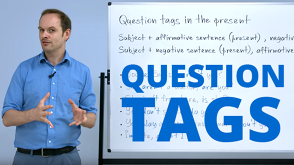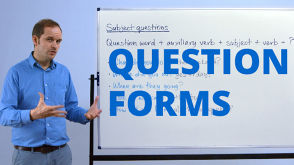Learn real English from movies and books.
Add words or phrases for learning and practice with other learners.
-
STEP 1Watch the video

-
STEP 2Do the exercises

-
STEP 3Add phrases you like to Favorites

Polite question forms
- 00:00 / 00:00
Click on a word or highlight a phrase to see translation
Click on a word or highlight a phrase to see translation
Click "plus" to add word/phrase for learning
Click "plus" to add word/phrase for learning
Start learning
Start learning
Polite question forms
An important feature of the English language is the ability to ask questions in a polite way. Polite questions are useful in situations such as business, you might be asking a client some difficult questions (personal questions, for example), or situations when you need somebody, who you do not know, to help you; possibly you are on the phone asking for train tickets or booking a hotel room, for example. When speakers of English use polite question forms, they take direct questions or statements and use a different sentence structure. Sometimes the word order is different in polite questions sometimes other words are used.
Polite question forms - Could you…?
|
Direct statement/question |
Polite question form |
Explanation |
|
Open the door |
Could you open the door?
|
One way of making an imperative/statement more formal/polite is by using the construction could you. When we use statements in this way, the word order stays the same. |
|
Where is the garage? |
Could you tell me where the garage is? |
With conventional questions without an auxiliary verb, the word order changes in the polite question form. With could you, the verb is moved to the end of the question. Also, you will notice the addition of tell me when we adapt direct questions in this way |
|
Is there more cheese? |
Could you tell me if there is any more cheese? |
If the question is a yes/no question and we use the could you tell me construction, the word if is used and the word changes to that of an affirmative sentence |
| Where do you live? |
Could you tell me where you live? |
When we change questions with an auxiliary verb (do/did, for example) with the polite question form could you, the auxiliary verb is removed. |
It is easy to use the polite question form could you but get the word order wrong. It is important to remember that the word order changes when using the could you tell me polite question form
Could you tell me what time it is? NOT Could you tell me what time is it?
It is also easy to forget to remove the auxiliary verb from the questions that we want to make more polite
Could tell me what you did? NOT Could you tell me you did do?
Polite question forms - Do you know...?
|
Direct question |
Polite question form |
Explanation |
|
Where is the cinema? |
Do you know where the cinema is?
|
When we use the Do you know where polite question form, the verb goes to the end not after the question word like in more conventional questions |
|
What time do the shops close? |
Do you know what time the shops close? |
The auxiliary verb is removed when we use the do you know polite question form |
|
Is he here? |
Do you know if he is here? |
If we make a yes/no question more polite/formal with the do you know question form, we use if |
Polite question forms - Would you mind…?
|
Direct question/Statement |
Polite question form |
Explanation |
|
Turn the music down |
Would you mind turning the music down?
|
The would you mind question form is unusual because we use the –ing form of the verb after it |
|
Be more careful |
Would they mind being more careful? |
Statements become questions with would you mind, the –ing form is used |
|
Can we watch something else? |
Would you mind if we watched something else? |
When the question is a yes/no question, we use if with the would you mind question form |
The answer to the would you mind question form is unconventional. When we say yes we mean no and when we say no we mean yes
Would you mind giving me some money? Yes (I'm not giving you money!)
Would you mind if I open the window? No (you can open the window)
Similar video exercises
Click on a word or highlight a phrase to see translation
Click on a word or highlight a phrase to see translation
Click "plus" to add word/phrase for learning
Click "plus" to add word/phrase for learning




